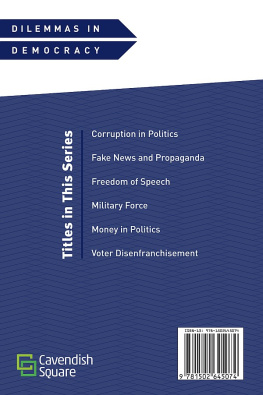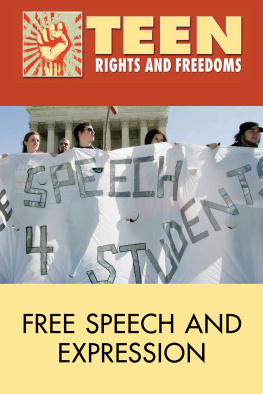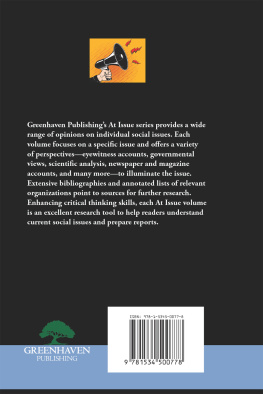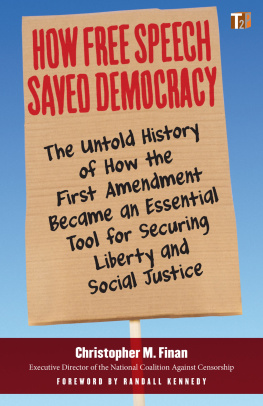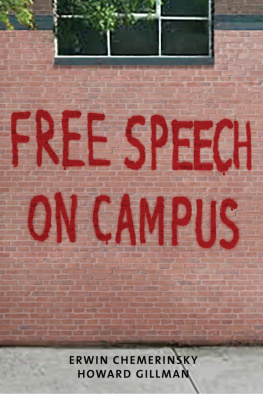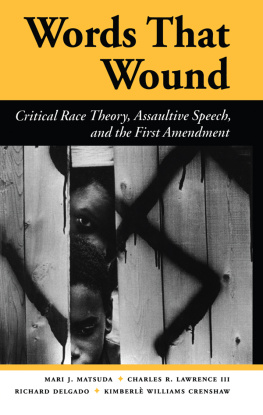Cover
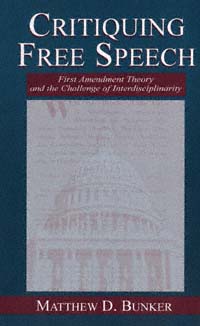
| title | : | Critiquing Free Speech : First Amendment Theory and the Challenge of Interdisciplinarity |
| author | : | Bunker, Matthew D. |
| publisher | : | Lawrence Erlbaum Associates, Inc. |
| isbn10 | asin | : | 0805837515 |
| print isbn13 | : | 9780805837513 |
| ebook isbn13 | : | 9780585381305 |
| language | : | English |
| subject | Freedom of speech--United States, United States.--Constitution.--1st Amendment, Interdisciplinary approach to knowledge. |
| publication date | : | 2001 |
| lcc | : | KF4772.B86 2001eb |
| ddc | : | 342.73/0853 |
| subject | : | Freedom of speech--United States, United States.--Constitution.--1st Amendment, Interdisciplinary approach to knowledge. |
Page i
Critiquing Free Speech
First Amendment Theory and the Challenge of Interdisciplinarity
Page ii
LEA'S COMMUNICATION SERIES
Jennings Bryant/Dolf Zillmann, General Editors
Selected titles in Journalism (Maxwell McCombs, Advisory Editor) include:
Bunker Critiquing Free Speech: First Amendment Theory and the Challenge of Interdisciplinarity
Bunker Justice and the Media: Reconciling Fair Trials and a Free Press
Friedman/Dunwoody/Rogers Communicating Uncertainty: Media Coverage of New and Controversial Science
McCombs/Reynolds The Poll with a Human Face: The National Issues Convention Experiment in Political Communication
Merrill/Gade/Blevens Twilight of Press Freedom: The Rise of People's Journalism
Merritt Public Journalism and Public Life: Why Telling the News is Not Enough, Second Edition
Perloff Political Communication: Politics, Press, and Public in America
Wanta The Public and the National Agenda: How People Learn About Important Issues
For a complete list of other titles in LEA's Communication Series, please contact Lawrence Erlbaum Associates, Publishers
Page iii
Critiquing Free Speech
First Amendment Theory and the Challenge of Interdisciplinarity
Matthew D. Bunker
University of Alabama
 | LAWRENCE ERLBAUM ASSOCIATES, PUBLISHERS |
| 2001 | Mahwah, New Jersey | London |
Page iv
Copyright 2001 by Lawrence Erlbaum Associates, Inc.
All rights reserved. No part of the book may be reproduced in any form, by photostat, micro-form, retrieval system, or any other means without the prior written consent of the publisher.
Lawrence Erlbaum Associates, Inc., Publishers
10 Industrial Avenue
Mahwah, NJ 07430
| Cover design by Kathryn Houghtaling Lacey |
Library of Congress Cataloging-in-Publication Data
Bunker, Matthew D.
Critiquing free speech: First Amendment theory and the challenge of interdisciplinarity
/ Matthew D. Bunker
p. cm.
Includes bibliographical references and index.
ISBN 0-8058-3751-5 (cloth: alk. paper)
1. Freedom of speechUnited States. 2. United States. Constitution. 1st Amendment. 3. Interdisciplinary approach to knowledge. I. Title.
| KF4772.B86 2001 |
| 342.73'0853dc21 | 00-057683 |
| CIP |
Books published by Lawrence Erlbaum Associates are printed on acid-free paper, and their bindings are chosen for strength and durability.
Printed in the United States of America
10 9 8 7 6 5 4 3 2 1
Page v
For Lois
Page vi
Page vii
Contents
| Preface | ix |
| Introduction | xi |
| Classical First Amendment Theory | 1 |
| Imperial Paradigms and Reductionism | 18 |
| Stanley Fish, Literary Theory, and Freedom of Expression | 63 |
| First Amendment Theory and Conceptions of the Self | 100 |
| The Public-Private Distinction and the New Realism | 127 |
| The Normative First Amendment | 157 |
| Shall We Commit First Amendment Theory? | 182 |
| Author Index | 195 |
| Subject Index | 201 |
Page viii
Page ix
Preface
This book is the culmination of several years of thinking about interdisciplinary legal studies and the First Amendment. Although I'm quite sure some of the answers I propose will be found wanting by some, I hope that at least the questions raised will prove worthwhile. This last statement I make with some trepidation, aware as I am of the dictum of that quintessential postmodern professor, Morris Zapp, a character in the academic novels of author David Lodge. As Professor Zapp once mused: Any damn fool, he maintained, could think of questions; it was answers that separated the men from the boys. 1 Be that as it may (and passing over the sexist wording), sometimes the act of questioning an existing theoretical structure can prove at least as valuable as any answers to which the questioning may lead. Definitive answers are few and far between in this business. At times, interdisciplinary legal scholars present their work as if their own assumptions and theoretical commitments were beyond question. As I hope to show in these pages, this is simply not the case.
1 David Lodge, Changing Places 45 (1975).
Page x
I would like to thank the University of Alabama for support in writing the book. I was fortunate enough to receive two separate summer research grants and a sabbatical that allowed me to work on portions of the manuscript. In particular, thanks to my department chair, Ed Mullins, and my dean, Cully Clark, for their most generous support. Many thanks also to Jennings Bryant, the series editor, for his kindness and his enthusiasm for the project. Im most grateful to a large number of thoughtful colleagues, including anonymous reviewers, who read and commented on earlier versions of portions of this work. Some earlier versions of chapters herein appeared as articles in the journal Communication Law and Policy , and I appreciate the insights gained from those who read those pieces. In particular, many thanks to Sandra Braman, Bill Chamberlin, Carrie Crenshaw, Paul Gates, Don Gillmor, Tim Gleason, Steve Helle, Susan Dente Ross, Tom Schwartz, and Bob Trager. Despite all of their invaluable suggestions and valiant attempts to enlighten me, I, of course, remain responsible for all errors and faulty interpretations. I would also like to thank Linda Bath-gate, communications editor at Lawrence Erlbaum Associates, for her marvelous support for the project and her gracious help through the publication process. The greatest debt of all is owed to my wife, Lois Graham, without whose encouragement and support the book would not have been possible.
Page xi
Introduction
Mainstream First Amendment theory is under assault. Free speech should be protected, liberal theorists 1 have proposed, for a number of important reasons, including democratic self-governance, self-realization, respect for individual autonomy, the search for truth, and a variety of other reasons. 2 While these classical free speech justifications still have significant influence, free speech theory is nonetheless in a state of great ferment. The notion that government should extend to individuals the greatest possible rights of free expression (long nearly a truism among scholars in law, communication, and related disciplines) has become subject to significant challenges. The old consensus of expanding free expression rights has been challenged in a series of critiques by feminist legal scholars, critical legal theorists, communitarian theorists, critical race theorists, literary
Next page

